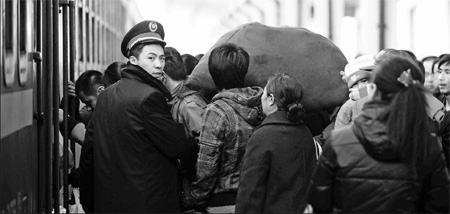Bull fighting
Confident scalpers laugh off predictions that the new train ticketing system will wipe out 'yellow bulls' China Daily report.
|
|
|
More than 70,000 passengers passed through the platforms of Harbin Railway Station, Heilongjiang province, on Saturday, the first day of the annual 'spring rush', a peak travel time. |
As the man strolled beside the long lines outside Beijing Railway Station, occasionally stopping to chat with random strangers, the casual observer would be forgiven for thinking he was just another migrant worker, or even a beggar asking for spare change. Few would immediately recognize this man in a scruffy blue jacket and worn trousers as a ticket scalper.
"I know someone who works for the railway station, so you don't have to line up," whispered the man to a China Daily reporter posing as a potential customer.
He led our reporter to the front of a queue and murmured something to the official ticket seller through the glass. After a moment he turned and announced he could get a ticket immediately - but it would cost the reporter extra.
"If you want to queue, go ahead; but you will never get the ticket," said the scalper, who refused to give his name. "At the end of the day, you'll come to me anyway."
Being a huang niu - or yellow bull, so called because of the immense power they wield - is a lucrative career in China. Ticket scalping generates about 1.8 billion yuan ($260 million) every Spring Festival, according to government statistics. To slay these "bulls", however, the State is piloting a new system that requires passengers to give their names and identity numbers when booking tickets.
The system has been running at 37 stations across Sichuan, Guangdong and Hunan provinces since Jan 21, but not in Beijing. The plan is designed to prevent scalpers from buying large amounts of tickets during the "spring rush" - the peak time for ticket sales in China - and selling them on for higher prices, which puts extra pressure on Spring Festival travelers.
 0
0 







